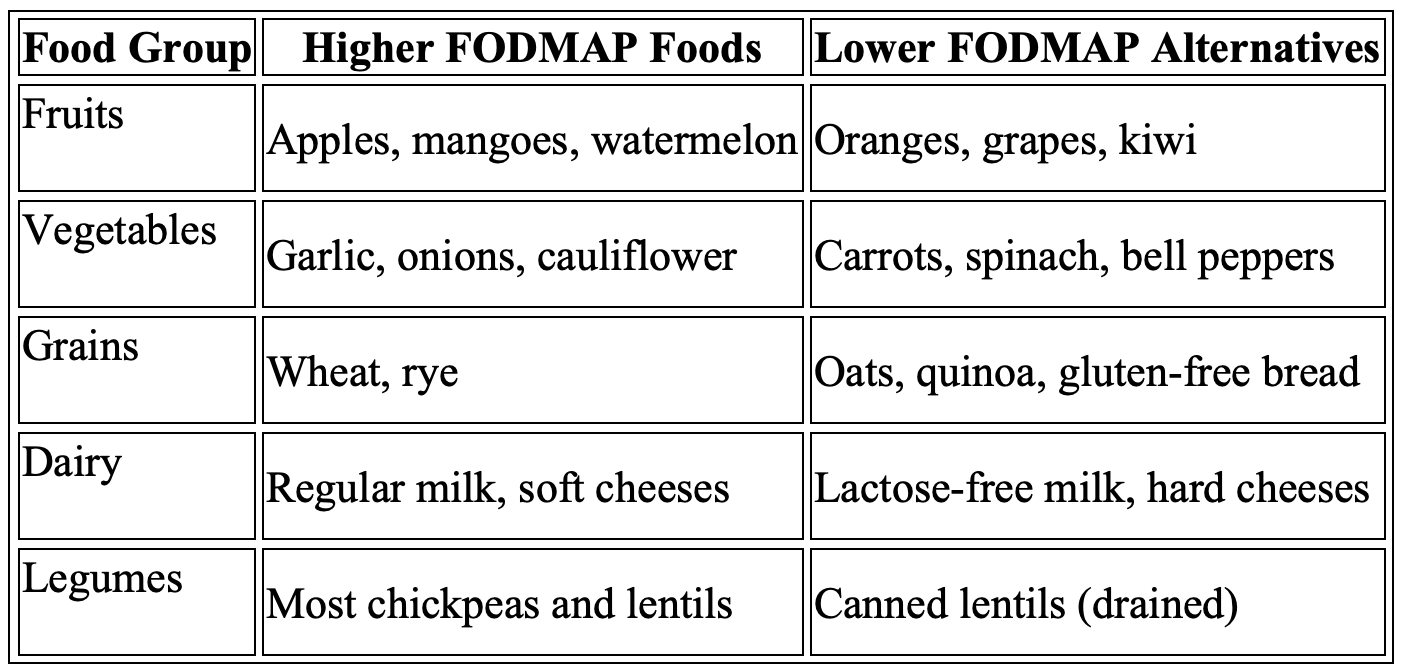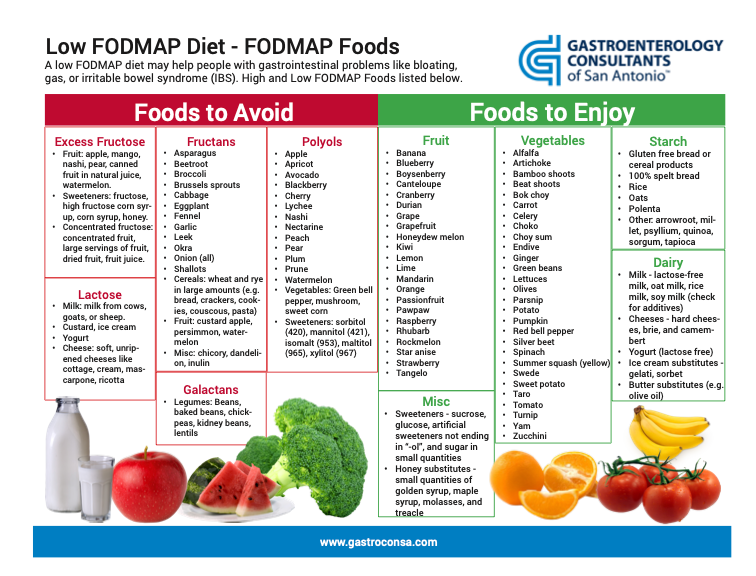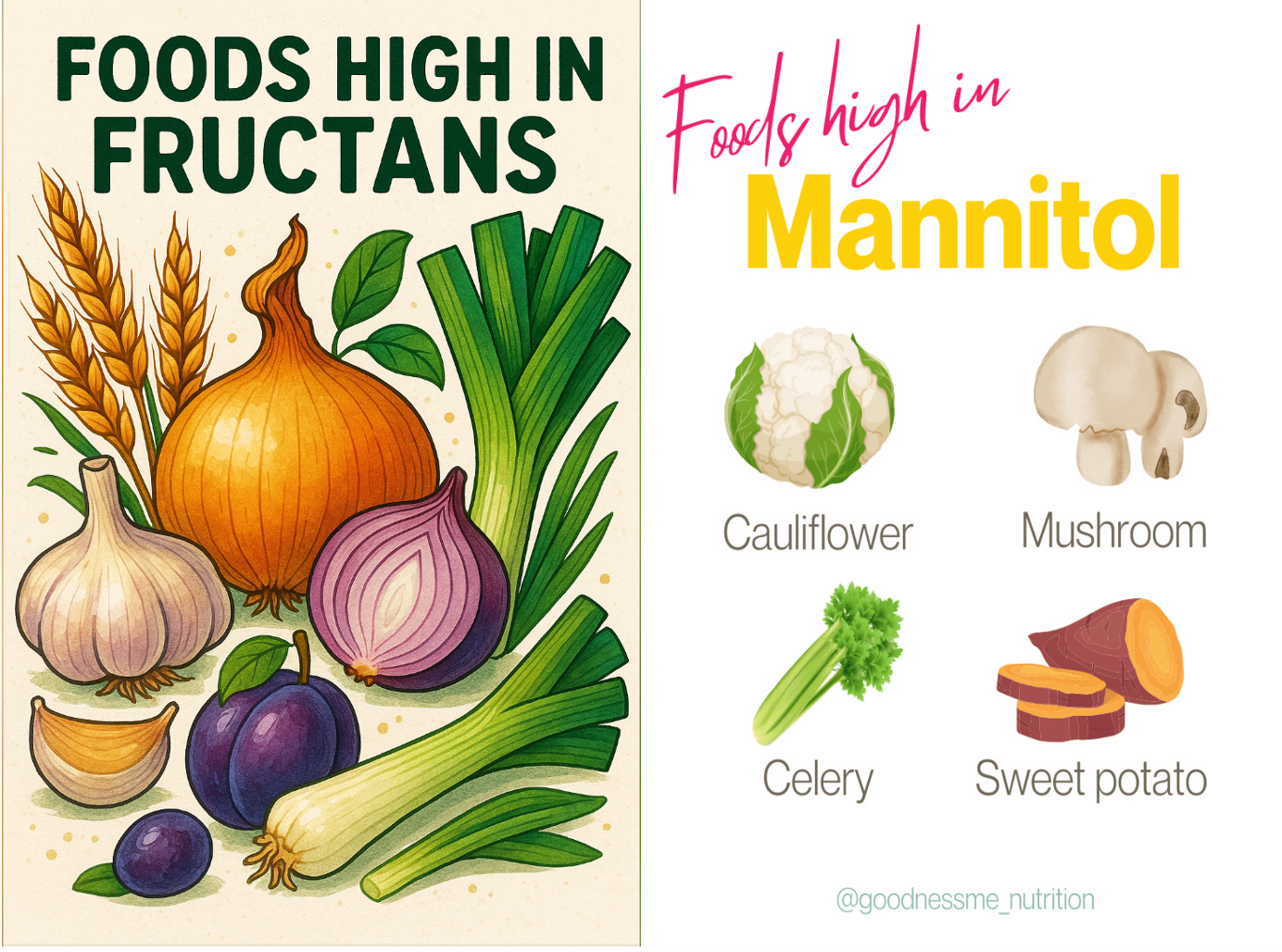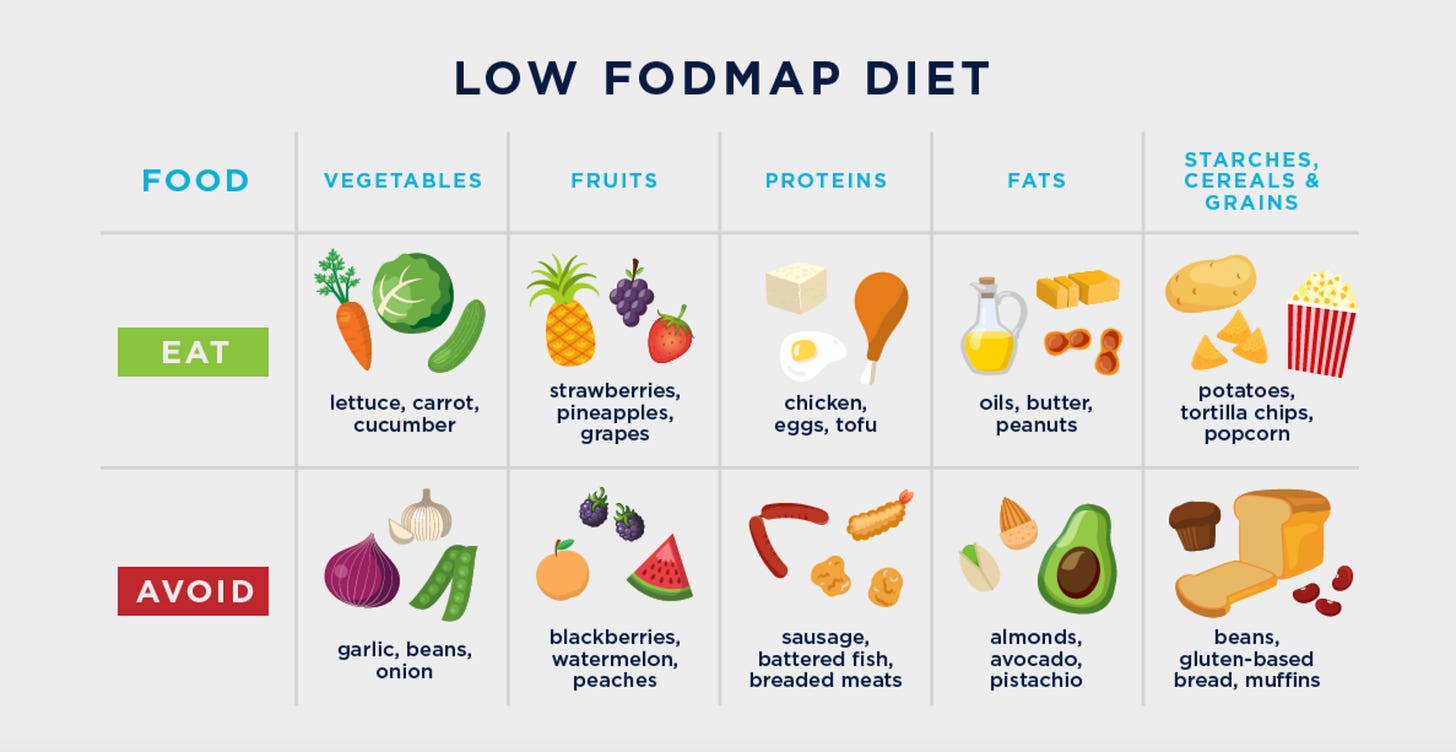Discover how cutting back on certain foods through this evidence based diet can ease your bloating and transform your gut health
“Patient to consider a low FODMAP diet”
Has your doctor ever suggested this approach?
If so, did you google it and think “where do I even start?”
I don’t blame you – it’s complex and definitely requires guidance from a gastroenterologist or, even better, a clinical dietitian.
However, when followed correctly, this approach can potentially minimise the cramping and bloating you experience with IBS.
Remember, IBS management is biosocial with many treatment options. Always seek your specialist’s approval before beginning this journey.
This comprehensive guide aims to break down this complex topic simply and give you actionable steps to move closer to a symptom-free gut.
What Are FODMAPs and How Do They Affect Your Gut?
If you’re struggling with digestive symptoms like bloating, abdominal pain, or irregular bowel movements, you may have heard about the low FODMAP diet.
This approach has helped many people with irritable bowel syndrome (IBS) and other digestive issues find relief.
FODMAPs are types of carbohydrates (sugars) that can be difficult for some people to digest. The term stands for:
- Fermentable
- Oligosaccharides (found in wheat, onions, and legumes)
- Disaccharides (like lactose in dairy)
- Monosaccharides (excess fructose in foods like apples and honey)
- And
- Polyols (sugar alcohols like sorbitol in stone fruits and mushrooms)
Why FODMAPs Can Cause Problems
When you eat foods high in FODMAPs, two main things happen that can trigger digestive symptoms:
- They draw water into your intestines – FODMAPs pull extra water into your small intestine, which can cause discomfort and looser stools. MRI studies demonstrate that high-FODMAP meals elevate luminal (inside the gut) water content by 45–70%, triggering distension and pain in visceral hypersensitivity (see my previous newsletter to learn more about visceral hypersensitivity)
- They’re fermented by gut bacteria – When FODMAPs reach your large intestine, bacteria there ferment them, producing gas (methane, hydrogen and carbon dioxide). This combination of extra gas and water can stretch your intestines, causing pain and bloating.
If you have IBS, you may be more sensitive to these normal digestive processes. Your gut nerves might overreact to the stretching, causing more pain than others would experience. Click here to find out more… Understanding IBS
Foods to Choose and Avoid
Here’s a simplified overview of common foods in each category:

And below is a more detailed overview:

All credit to the San Antonio team – this overview is perfect and puts everything into sub-groups. https://www.gastroconsa.com/patient-education/irritable-bowel-syndrome/low-fodmap-diet/
Interestingly, food processing can affect FODMAP content. For example, canned lentils (when drained) have fewer FODMAPs than dried lentils you cook yourself.
Is This Diet Right for You?
The low FODMAP diet may be worth trying if:
- You have confirmed IBS and haven’t found relief with fibre supplements or antispasmodics
- You experience chronic bloating and digestive discomfort
- Your doctor or dietitian has recommended it….this is not something you should just “DIY”
However, this diet is NOT for everyone. It requires careful planning and may not be appropriate if you:
- Have inflammatory bowel disease (like Crohn’s or ulcerative colitis) without IBS symptoms
- Have or are at risk for an eating disorder
- Are pregnant or breastfeeding (unless supervised)
Ideally, you need regular input from a gastroenterologist or specialist dietitian to guide you through the three phases of the diet.
How the Low FODMAP Diet Works: A Three-Step Approach
Ok brace yourself! We are about to dive in….
The low FODMAP diet is not meant to be followed strictly forever.
Instead, it follows three important phases:
Phase 1: Restriction (2-6 weeks)
During this short-term phase, you will reduce all high-FODMAP foods to give your digestive system a break.
This helps determine if FODMAPs are triggering your symptoms.
An example meal plan whilst in phase 1:
Breakfast: Oats with lactose-free milk, strawberries.
Lunch: Grilled chicken, quinoa, spinach, carrots.
Snack: 30g almonds (low-FODMAP serving).
Dinner: Salmon, rice, courgette
Phase 2: Re-introduction (6-8 weeks)
This crucial phase involves systematically testing each FODMAP group to discover which specific FODMAPs and amounts trigger your symptoms.
You will challenge your body with one FODMAP type at a time, monitoring how you feel.
This is the stage where you truly need guidance from a dietitian or gastroenterologist to help determine which foods to re-introduce and when.
Phase 3: Personalisation (long-term)
The final phase is about creating your customised diet that excludes only the FODMAPs that trouble you.
This helps ensure your diet remains nutritious and enjoyable while managing symptoms.
How to Implement the Diet Successfully
During the Restriction Phase:
- Work with a dietitian experienced in the low FODMAP approach
- Use a food diary to track what you eat and your symptoms
- Consider using the Monash University FODMAP Diet App (the creators of the diet) https://www.monashfodmap.com/ibs-central/i-have-ibs/get-the-app/
- Aim to keep your daily FODMAP intake under the therapeutic threshold
- Follow a balanced meal plan with plenty of low-FODMAP alternatives
During Re-introduction:
- Test one FODMAP group every few days (for example: fructans → lactose → polyols) (see the diagram above)
- Start with small amounts and gradually increase
- Record your symptoms carefully – a 50% increase in symptoms suggests intolerance
- Be aware that common triggers include fructans (for about 56% of IBS patients) and mannitol (for about 54%)
- Foods high in fructans are: garlic, onions, wheat, leek bulbs
- Foods high in Mannitol are: cauliflower, mushroom, celery, sweet potato

For Long-Term Management:
- Re-introduce all tolerated FODMAPs to maintain nutritional balance
- Find your personal thresholds (you might tolerate small amounts occasionally). For example, if garlic is a trigger food, having a small amount at a restaurant once in a blue moon will hopefully not cause a flare.
- Consider strategies to support your gut microbiome, since restricting FODMAPs long-term can affect beneficial bacteria. Check this out if you haven’t already.https://drhussenbux.substack.com/p/5-ways-to-naturally-improve-your
Clinical research has consistently shown that the low FODMAP diet is highly effective for people with IBS, with studies suggesting that 50–80% of individuals experience significant symptom relief.
One notable study revealed low FODMAP reduced bloating by up to 72% and decrease abdominal pain by about 60%.
A 2022 network meta-analysis of 13 randomised controlled trials involving 944 participants ranked the low FODMAP diet as the most effective dietary intervention for improving IBS symptoms, even outperforming the British Dietetic Association guidelines.
The diet is especially beneficial for those with diarrhoea-predominant IBS (IBS-D), offering targeted relief from some of the most troublesome symptoms.

New Developments
There are promising new developments that could make your low FODMAP journey even better! Researchers are looking at ways to enhance this approach, like blending it with Mediterranean diet principles; think more olive oil, fish, and vegetables, which could help not only reduce your symptoms but also promote long-term gut and liver health.
In the future, I hope we see the development of special blood tests to study our individual gut bacteria patterns that might help us predict exactly who will respond best to this diet.
There’s also some encouraging work being done on developing specific supplements that could support your gut health while you’re following the low FODMAP plan.
Important Reminders
- The restriction phase is temporary – not a forever diet
- Re-introduction is essential for nutritional balance
- Working with a dietitian will improve your success
- The diet should be part of a comprehensive treatment plan
Remember, while this diet helps many people, everyone’s digestive system is unique.
What works for others may not work exactly the same way for you.
With patience and careful tracking, you can discover your own personal food triggers and develop an eating plan that keeps you comfortable while still enjoying a wide variety of foods.
Struggling with digestive issues that affect your daily life? Invest in your gut health with a private, personalised consultation where I will explore your specific symptoms and develop a targeted treatment plan. Take the first step toward digestive wellness today: https://bucksgastroenterology.co.uk/contact/
References
- Bertin L et al. The Role of the FODMAP Diet in IBS. Nutrients. 2024 Jan 26;16(3):370. doi: 10.3390/nu16030370.
- Staudacher HM, Whelan K. The low FODMAP diet: recent advances in understanding its mechanisms and efficacy in IBS. Gut. 2017 Aug;66(8):1517-1527.
- Black CJ, Staudacher HM, Ford AC. Efficacy of a low FODMAP diet in irritable bowel syndrome: systematic review and network meta-analysis. Gut. 2022 Jun;71(6):1117-1126
- Tuck C et al. Fermentable short chain carbohydrate (FODMAP) content of common plant-based foods and processed foods suitable for vegetarian- and vegan-based eating patterns. J Hum Nutr Diet. 2018 Jun;31(3):422-435
- https://www.gastroconsa.com/patient-education/irritable-bowel-syndrome/low-fodmap-diet/
- Whelan K, Martin LD, Staudacher HM, Lomer MCE. The low FODMAP diet in the management of irritable bowel syndrome: an evidence-based review of FODMAP restriction, reintroduction and personalisation in clinical practice. J Hum Nutr Diet. 2018 Apr;31(2):239-255
- https://www.goodnessme-nutrition.com/
- Kasti AN et al. Is the Mediterranean Low Fodmap Diet Effective in Managing Irritable Bowel Syndrome Symptoms and Gut Microbiota? An Innovative Research Protocol. Nutrients. 2024 May 23;16(11):1592.
- Narimani, B., Sadeghi, A., Daryani, N.E. et al. Effectiveness of a novel diet in attenuation of clinical activity of disease in patients with ulcerative colitis: a randomized, clinical trial. Sci Rep 14, 13791 (2024)

